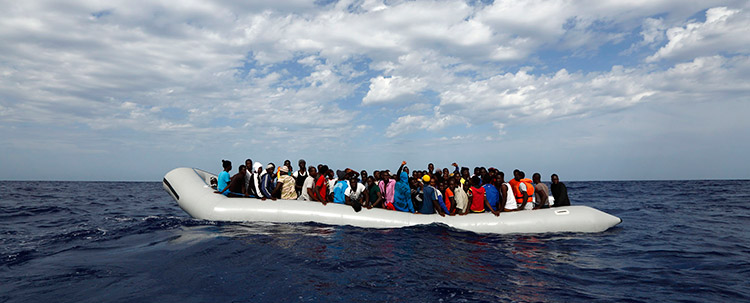Migrants do not have to drown, says volunteer SAR organisation
On February 11, 2015, 300 migrants drowned at sea. Their flimsy rubber rafts supplied by smugglers fell apart in the large waves. While the Italian Coast Guard dispatched ships from Lampedusa, the merchant ship charged with monitoring the distressed dinghies could not board safely, owing to Force Seven wind and waves. Once help arrived, the open boats offered little protection from the winter elements, and 29 more people died on the way to shore from hypothermia.

Desperate migrants undertake unbelievably hazardous journeys across the Mediterranean in unsuitable vessels and the death toll is rising (all images courtesy MOAS)
This was just one of a large number of incidents in which thousands of would-be migrants have drowned in the Mediterranean. And despite global news of the disaster, smugglers continue to launch thousands more desperate migrants from war-torn Libya and other countries.
The Italian coastal patrol programme, Operation Triton, is run by Frontex and as such, is primarily a border control operation, not a search and rescue mission. This programme involves guarding the 7,600km long coast a mere 30 miles from the shores of Italy. Although long-range aircraft are in the air, and Coast Guard and commercial ships are repeatedly pulled in to assist rescues, migrants are attempting the dangerous journey across the Mediterranean in greater numbers than ever before.
According to the UNHCR, over 200,000 people received help during sea crossings in 2014. More than 3,200 died in their attempts to reach the European shore. The International Organisation for Migration (IOM) suggests that this is only the beginning.
Last October, the Italian mission Mare Nostrum was cancelled owing to lack of interest from EU states in providing continued funding, and assertions by politicians that the operation actually encouraged more migrants to undertake the hazardous voyage.
Last week’s incidents of over 3,000 migrants fleeing for Lampedusa knowing that Operation Triton would be hugging the shoreline, crushed that mythical narrative.
This year, the number of migrant deaths has already risen by 1,481% when compared to the same period last year.
It is clear that with the weak international response the onus for rescue in 2015 has been shifted to the Mediterranean’s busy commercial ships and the international sailors. Indeed, on February 20, 2015, industry representatives announced they would be lobbying the EU to explain why the shipping sector should no longer be expected to shoulder the burden of large scale migrant rescues in the Mediterranean Sea.
“In 2013, when hundreds of desperate people were drowning crossing the Mediterranean, I knew I had to do something,” says Christopher Catrambone (pictured right), founder of Migrant Offshore Aid Station (MOAS). ”There were charities helping migrants in Africa, and charities helping landed migrants, but there were no NGOs for them during the most dangerous part, the sea crossing.”
He is adamant that he did not want to get involved in the politics of irregular migration: “I simply wanted to stop the deaths at sea while governments wrestled over solutions.” So he, and a group of professionals founded MOAS, which is a rough-weather vessel equipped with long range drones and staffed by a top-notch search and rescue team.
Last year MOAS rescued 3,000 migrants in distress, he says: “These men, women and children forced by humanitarian or economic reasons to cross the deadliest border in the world: the Mediterranean Sea. The idea many people had told me was ‘impossible’ turned out to be a success.”
Taking the politics out of Search and Rescue helps all parties involved, explains Catambone: “It simplifies the rescue co-ordination process and guarantees disembarkation at the nearest safe port. It puts priority on helping people in distress, no matter where they come from. It takes pressure off the hundreds of commercial vessels that are forced to stop and sometimes repatriate hundreds of migrants.
“The mariners could get back to business, leaving rescue operations to purpose-built operations like MOAS.”
In 2015 MOAS is looking to expand its rescue operations using only private donations, he says. “We have proven that we can respond, co-ordinate and assist in search and rescue to save lives, and we do this because nobody deserves to die at sea.”
To donate or assist MOAS, click here